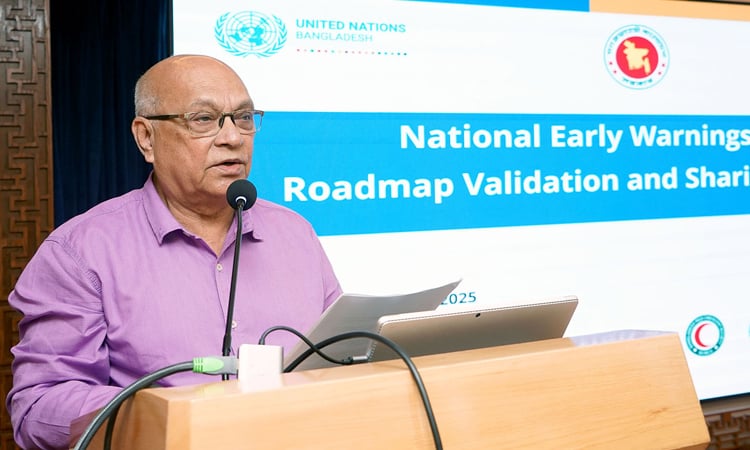News Flash
News Flash

DHAKA, June 24, 2025 (BSS) - Disaster Management and Relief Adviser Faruk E Azam, Bir Protik, today said early warning systems remain one of the most effective tools for saving lives in disaster-prone Bangladesh.
“Early warning isn't merely information—it's a lifeline. In a disaster-prone country like Bangladesh, timely alerts have proven to be one of the most powerful tools for saving lives,” he said.
He added, “We’ve seen this success firsthand. In 1970, nearly a million lives were lost in a single night. Today, that number has been reduced to single digits—or none at all — thanks to the implementation of our Cyclone Preparedness Programme, which now stands as a global model for disaster risk reduction.”
The adviser made the remarks while addressing the inaugural ceremony of the two-day “Early Warning for All” national validation and sharing workshop at the BM Foundation Auditorium here, said a press release today.
He said, “In addition to modernizing our early warning system due to climate change and various natural and man-made causes, we also have to take into account multidimensional disasters. So we did not stop. We are trying to strengthen early warning for cyclones and floods as well as landslides, lightning, droughts, heat waves, cold waves, and even urban disasters.”
Faruk E Azam said that the government is already allocating its own funds to implement early warning for all and planning to increase investment in this sector.
“We have already suggested taking up the necessary projects to implement it. However, this is not the government’s job alone. Everyone’s participation will be required. For this, we need international assistance, multi-year commitment, risk pooling and innovative financing models,” he said.
Mentioning that even if there is technology, if it does not reach the people, its usefulness decreases, he said, “Therefore, we are emphasizing on community participation, transparent information flow and designing and distributing messages in simple and local languages.”
He added, “Our goal is not just to provide information, but to build the capacity to respond by understanding and accepting it.”
The adviser said that the Chief Adviser of the interim government has expressed his international commitment on climate adaptation and disaster resilience.
Bangladesh has collectively joined the global initiative “Early Warning for All” based on the continuous emphasis, investment and planning of the Bangladesh government on disaster risk reduction, he highlighted.
He said, “Early warning for all is an ongoing process. This roadmap has been prepared in line with the national plans (such as NPDM, NAP). Through today’s workshop, we want to make this journey deeper, more realistic and human-centric. We want Early Warning for All to become not just a promise but a reality.”
With Disaster Management and Relief Secretary Md. Mostafizur Rahman in the chair, Bangladesh Red Crescent Society Chairman Major Gen (Retd) Professor Dr Md Azizul Islam, UN Resident Coordinator Gwyn Lewis, Chargé d'Affaires of the Swedish Embassy Maria Stridsman, and senior officials from development partners, government and non-governmental organizations spoke.